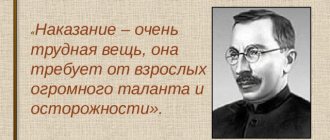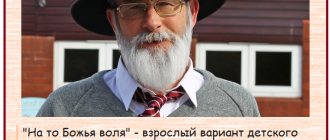Even opposition is considered harmless if it does not harm. No, apparently, there are corners in God’s world where all times are transitional.
Man is designed in such a way that he seems to be reluctant and distrustful of happiness, so happiness must be imposed on him.
***
A revolution broke out in France, and it became clear to everyone that “enlightenment” is useful only when it is of an unenlightened nature.
***
Everywhere literature is valued not on the basis of its most vile examples, but on the basis of those of its figures who truly lead society forward.
***
Be prepared not to do this or that, but to endure.
***
In order to pacify wretched people, you need to have a much greater reserve of courage than in order to shoot at people who do not have flaws.
***
Shame is a person’s most precious ability to put his actions in accordance with the requirements of that highest conscience, which is bequeathed by the history of mankind.
***
Trustworthiness is a mark, to acquire which you need to do some dirty tricks.
***
Although there are plenty of laws in the Russian State, all of them have scattered for various reasons, and it is even very hopeful that most of them burned down in former fires.
To transform Russia, it was necessary for the scoundrels to be visible, so that they would not do shit in secret, but would do it if they had enough courage, in front of the entire public.
***
- It has always seemed to me that our fatherland needs not so much abundance as efficient police officers.
***
The words “slowly and little by little” should be written on the banner of truly reasonable Russian progress.
***
It’s nothing that in Europe they give one fifty dollars for our ruble; it will be worse if they start punching us in the face for our ruble.
***
We will use the expression “ruble” in vain, since it costs half a ruble, but if the authorities find this correct, then their desire must be fulfilled unquestioningly.
***
- And then there were people who suspected that such an impetuous transition from selfless cannibalism to no less selfless liberalism did not seem entirely natural.
***
I can't imagine that any issue doesn't have a proper boss.
***
The only difference is that in Rome wickedness shone, and in ours it was piety, Rome was infected by violence, and us by meekness, in Rome the vile mob was raging, and here we were the bosses.
***
But in essence, what is St. Petersburg? - the same son of Moscow, with the only peculiarity that it has the shape of a window to Europe, cut out with censorship scissors.
***
Nowadays people are so weak that even at the sight of a hundred-ruble credit card they lose the thread of their actions - what will happen when they see a whole million in the fog!
***
The sycophants are a special breed that has appeared, whose banner says: lie and be free from limits.
Quotes from Saltykov-Shchedrin
Prepared by: Dmitry Sirotkin
I present to you a selection of quotes from the writer Mikhail Saltykov-Shchedrin (1826 - 1889).
His satirical denunciations of Russian reality are perceived as somehow too fresh.
Quotes are summarized by topic: officials, ordinary people, literature, Russia, stupidity, laws, Russians, human manifestations, drunkenness, theft, morals, business issues, life, patriotism, religion, authorities.
About officials
This does not depend on me.
In the matter of administrative reputation, the entire future of the administrator depends on the first step.
They expected bloodshed from him, but he ate the siskin.
And he even admitted that the very misconceptions of people should not always have the inevitable consequence of execution.
All magic in the world comes from the authorities.
When meeting with superiors, it is permissible to express the pleasure one feels in this with polite and respectful body movements.
What better way to express trust than by unquestioningly doing what you don’t understand?
I am a man of culture because I served in the cavalry.
About ordinary people
No matter what happens.
The average person is always to blame for something.
On the one hand, one cannot help but admit, on the other hand, one cannot help but confess.
The words “not noticed in anything” already contain a whole reputation, which in no way will allow a person to plunge without a trace into the abyss of absolute obscurity.
Let everyone keep in mind that if an ordinary person temporarily sins, then he can do even more useful deeds.
There is nothing more dangerous than a person who is alien to humanity, who is indifferent to the fate of his native country, to the fate of his neighbor, to everything except the fate of the altyn he has put into circulation.
Those who think that only those minnows can be considered worthy citizens who, mad with fear, sit in holes and tremble, believe incorrectly. No, these are not citizens, but at least useless minnows.
About literature
The writer writes, the reader reads.
Literature has been removed from the laws of decay. She alone does not recognize death.
All great writers and thinkers were great because they talked about the fundamentals.
There is no more enlightening, soul-cleansing feeling than that which a person feels when acquainted with a great work of art.
Everywhere literature is valued not on the basis of its most vile examples, but on the basis of those of its figures who truly lead society forward.
In view of the general slavish mentality, an allegory still has a chance of being more understandable and convincing and, most importantly, attractive than the most understandable and convincing speech.
Talent in itself is colorless and acquires color only in application.
About Russia
If I fall asleep and wake up in a hundred years and they ask me what is happening in Russia now, I will answer: they drink and steal.
No, apparently, there are corners in God’s world where all times are transitional.
It’s nothing that in Europe they give one fifty dollars for our ruble; it will be worse if they start punching us in the face for our ruble.
Many people tend to confuse two concepts: “Fatherland” and “Your Excellency.”
The Fatherland is that mysterious but living organism, the outlines of which you cannot clearly define for yourself, but whose touch you constantly feel, because you are connected to this organism by a continuous umbilical cord.
Going forward is difficult, going back is impossible.
About stupidity
There is no such thing as stupidity, such stupidity!
Enormous strength - the persistence of stupidity!
Idiots are generally very dangerous, and not even because they are necessarily evil, but because they are alien to any considerations and always go ahead, as if the road on which they find themselves belongs to them alone.
The mind was given to man not in order to experience the unknown, but in order to abstain from sins.
Strunnikov could not be called stupid, in the rough sense of the word, but he was only smart enough to, as they say, not eat tallow candles and not wipe himself with glass.
About laws
The severity of Russian laws is mitigated by the optionality of their implementation.
The worst laws are in Russia, but this shortcoming is compensated by the fact that no one implements them.
The purpose of issuing laws is twofold: some are issued for the greater peoples and countries of the dispensation, others - so that legislators do not become stagnant in idleness.
The first and only paragraph of this charter read like this: “If you feel that the law places an obstacle on you, then remove it from the table and put it under you. And then all this, having become invisible, will greatly facilitate you in action.”
About Russians
We have no middle ground: either the snout or the hand!
If in Holy Rus' a person begins to be surprised, then he will be dumbfounded in surprise and so stand like a pillar until death.
They are on their knees, and you can see in their eyes that they are rebelling...
Well, it’s not like that with us, brother. Not only would they eat our apples, but they would also break off all our branches! The other day Uncle Sofron walked past a mug of kerosene - and he drank it all!
By the way, quotes about Russians
About human manifestations
Talkativeness conceals a lie, and lies, as we know, are the mother of all vices.
It’s scary when a person speaks and you don’t know why he’s talking, what he’s saying and whether he’ll ever finish.
One likes watermelon, the other likes pork cartilage.
He didn’t so much fight as he was fought.
About drunkenness
Alas! Not even a quarter of an hour had passed, and it already seemed to me that now was the time to drink vodka.
The grimy one is coming! goes, and to the question: what is truth? he will answer firmly and strictly: drinking and taking away.
An unsociable person who does not take part in drinking parties must certainly be ill-intentioned and malicious.
About theft
When and what bureaucrat was not convinced that Russia is a pie that you can freely approach and snack on?
In all countries, railways are used for transportation, and in our case, they are also used for theft.
In order to steal successfully, you only need to have agility and greed. Greed is especially necessary because petty theft can lead to prosecution.
About morals
Every ugliness has its decency.
Young ladies are asked whether to wash their neck for a large or small neckline.
Nowadays, Mama, even without a husband is the same as living with a husband. Nowadays they laugh at the prescriptions of religion. We reached the bush, got married under the bush - and it was done. They call it a civil marriage.
About business matters
He was a scoundrel with a strong soul, and this is also a kind of power, possessing which one can conquer the world.
“A loan,” he explained to Kolya Persianov, “is when you don’t have money... you know?” There is no money, and suddenly - click! - they are! - However, mon cher, what if they demand payment? - Kolya lisped. - Oddball! You don't even understand such a simple thing! You have to pay - well, and again a loan! Another payment - another loan! Nowadays all states live like this!
About life
The world I explore is truly a world of ghosts. But I assert that these ghosts are not only not powerless, but have the most decisive influence on life.
Just as she herself, once she had entered the rut of life, almost mechanically filled it with the same content, so, in her opinion, others should have done the same.
By the way, quotes about life
About patriotism
When they often start talking about patriotism, it means that something has been stolen again!
There are people who knock with dead hands on dead Persians, who call out with cloth tongues “Ring the bell of victory!” and the surroundings look out with gaping hollows instead of eyes: who doesn’t knock on the chest and call out along with them?
About religion
He prayed not because he loved God and hoped through prayer to enter into communication with him, but because he was afraid of the devil and hoped that God would deliver him from the evil one.
Every person is supposed to bear a cross from God, and this is not done without a purpose, for without a cross, a person forgets himself and falls into depravity.
By the way, quotes about religion
About the authorities
The Russian government must keep its people in a constant state of amazement.
Implement education with moderation, avoiding bloodshed whenever possible.
About miscellaneous
I wanted something: either a constitution, or stellate sturgeon with horseradish, or to rip someone off.
Completely unimportant words were printed in large letters, and everything important was depicted in the smallest font.
Children are loving beings in whom everything, from themselves to the last rag they wear, all belongs to their parents. Therefore, parents can judge children; children of parents - never. Children's responsibility is to honor, not judge.
There is no task more worthy of a true liberal than to await further clarification with confidence.
As you know, for some time Saltykov-Shchedrin managed to combine work as a vice-governor (in Ryazan and then in Tver) with the work of a writer, branding vice-governors and other officials. There was no fundamental contradiction in this , since he did not look like an ordinary official, but there was a clear duality, so to speak, of the role position. In any case, he knew better than many writers how officials work in practice.
Quotes about Saltykov-Shchedrin
- I. Turgenev: You complain about the hatred of other people who even turn pale at your very name - you are in vain. - He who arouses hatred also arouses love. “If you were just a hereditary nobleman M.E. Saltykov, none of this would have happened.” - But you are Saltykov-Shchedrin, a writer who was destined to make a deep mark on our literature - so you are hated - and loved, depending on who. - And this is the “result of your life” that you are talking about - and you can be satisfied with it. (by the way, quotes from Turgenev)
- F. Dostoevsky: The theme of Shchedrin’s satire is a policeman hiding somewhere, who overhears him and informs on him: and Mr. Shchedrin cannot live from this. (by the way, quotes from Dostoevsky)
- I. Sechenov: Mikhail Evgrafovich Saltykov is a well-respected diagnostician of our social evils and ailments.
- L. Tolstoy: I read Shchedrin. And it’s good, yes it’s old, there’s nothing new. I definitely feel sorry for him. It's a pity for the lost power. (by the way, quotes from Tolstoy)
- A. Chekhov: I feel sorry for Saltykov. It was a strong strong head. That bastard spirit that lives in a petty, mentally defrauded middle-class Russian intellectual has lost in him his most stubborn and annoying enemy. (by the way, quotes from Chekhov)
- M. Gorky: This is a huge writer, much more instructive and valuable than they say about him. (by the way, quotes from Gorky)
- A. Lunacharsky: Shchedrin’s satire, for all its brilliant wit, is heavy, it’s simply difficult to read! She is so angry, she rings like a tense string, she is ready to break. She breaks your heart.
Next, you can move on to other collections of quotes:
- Gogol quotes
- quotes from Nekrasov
- quotes from Goncharov
- Griboyedov quotes
- quotes from Leskov
- Ostrovsky quotes
I would be grateful if you share the link to the article on social networks with your friends. Use the network buttons below .
Comments are also highly welcome!
A few words about Saltykov-Shchedrin
At all times, more or less closely, Saltykov-Shchedrin remained the focus of attention of critics and literary scholars of various schools and directions. The map of Russian literature through a special satirical prism, which outlined the very significant and influential Shchedrin territories, seemed to have taken shape. But whether the phenomenon of Shchedrin’s aesthetics, philosophy, poetics, and the mutual influence of his personal, literary “agenda,” so to speak, and the “agenda” of his contemporaries, can nevertheless be considered fully developed and clarified is a moot point. It is absolutely legitimate to think about why Shchedrin, “a writer by nature mainly verbal, stylistic and with a style that seems to be magazine-like, almost like a feuilletonist with his topical scoffing,” remains absolutely alive for us today, what is the secret, on the one hand, of such inexhaustible relevance, and on the other hand, with all its centrality, the finality of the situation in literature, where does this conspicuous isolation, separateness, alternativeness, which was acutely aware of the audience even during the life of Saltykov-Shchedrin, come from?
CONTEMPORARIES ABOUT SALTYKOV-SHCHEDRIN
V.P. Burenin recalled that Shchedrin was not a brilliant storyteller, as Turgenev or Grigorovich, great “masters of conversation,” were considered, for example. Shchedrin lacked that obvious artistry, the enjoyment of his own skills, he never “felt prepared, humor and wit broke out involuntarily, were the innate qualities of his speech... And with all the playfulness of his speeches, he... retained almost stern seriousness and never laughed himself...” .
A. M. Skabichevsky, who worked for many years with Shchedrin in Otechestvennye Zapiski, spoke about the special “energy” of Shchedrin’s speeches: “It was not his anger that was terrible, but rather those jokes with which he was able to destroy his interlocutor... He especially shone with the art of one or two in words, often based on one purely external sign, to outline a personality in the most comic form, at the same time extremely true”;
And Turgenev at one time derived “three formulas” that summarize and most clearly define Shchedrin’s place in the general context, its paradoxical nature, inconsistency, as well as opposition and natural resistance to the circle’s closed environment. Let's think about them. These formulas can be considered an extremely clear definition of Shchedrin’s alternativeness—even an imperative. So, the first sign: in post-reform times, with all the fragmented state of Russian literature and cultural life in general, Shchedrin, observing and confirming his creative right to a “special opinion”, a special view, open opposition to generally accepted positions, nevertheless remained, without a doubt, a central figure , fastening. Its fundamental, axial, fundamental function was recognized by both opponents and like-minded people. “You know, sometimes it seems to me that all our literature now rests on his shoulders. Of course, there are good, talented people besides him, but he holds literature,” this is how Turgenev, in a conversation with the publicist S. N. Krivenko, spoke about Saltykov-Shchedrin in May 1881. Sign two: Shchedrin can do something in literature that no one else can do. Its artistic function is absolutely exclusive. In this regard, Turgenev’s review of “The Family Court”, which he read in the October issue of “Notes of the Fatherland” (1875), is highly characteristic: “... why doesn’t Saltykov, instead of essays, write a major novel with a grouping of characters and events, with a guiding thought and broad execution ? But to this we can answer that novels and stories are, to some extent, written by others - and what Saltykov does is done by no one else.” And, finally, the last - the special quality of Shchedrin's writing, Shchedrin's word - the ability of tangible, almost physical impact, accuracy and self-control: “... There is something Swiftian about it: serious and tough humor, clear and sober realism, with the most unbridled play of imagination , and especially unshakable common sense, I am even ready to say - moderation, does not betray the author for a minute, despite the incontinence and exaggeration of the form. I saw how people laughed until they colicked while listening to the reading of some of Saltykov’s essays. There was something almost terrible in this laughter, because, laughing uncontrollably, the audience felt that a scourge was lashing itself.”
CATEGORY OF HISTORY IN SHCHEDRIN'S TEXTS
The literary jargon of the 1860s is clearly recognizable in Shchedrin’s texts: Mind, Shame, Conscience, Fatherland, Truth, each of which has its own fairly stable connotations and accompanying metaphors. Life in general: morning, garden, river, road; Modern life: desert, swamp, grave, “snowy plain shrouded in a shroud,” “night,” “silence,” “darkness,” “silence,” “numbness,” “fear.”
In “The Golovlev Gentlemen” these artistic means, creating fantastic clots of reality, act with extraordinary sharpness and power. Dying Pavel hears sounds: “suddenly there was dead silence. Something unknown and terrible surrounded him on all sides. Daylight poured sparingly through the lowered curtains, and since a lamp was glowing in the corner in front of the icon, the twilight filling the room seemed even darker and denser. He stared into this mysterious corner with his eyes, as if for the first time he was struck by something in this depth... Pavel Vladimirovich peered and peered and it seemed to him that there, in this corner, everything was suddenly moving. Loneliness, helplessness, dead silence - and in the middle of it there are shadows, a whole swarm of shadows. It seemed to him that these shadows were walking, walking, walking... "
Amidst this fear and growing horror, a special character appears - History. It has its own “suit” and recognizable properties. Shchedrin creates his own “philosophy of history”: history is understood as a fairy tale, legend and myth, edification, lesson; history is understood as a reference, a political and state archive. And finally, third. History is present as real experience. In the “intermediate time”, when “... people’s thought is resolved into a whole series of questions, conjectures and assumptions... - this is the only true leader...”
Shchedrin's tales are literally oversaturated with history; fairy-tale narratives are like “historical aphorisms”, historical parables presented in scenes and persons. In fairy tales we find a whole classification of different types of historical description: “Forest History”, a woodpecker completes work on the tenth volume of “The History of Woodies” “The motley people... splashed their hands and shouted: “Long live the hedgehogs!” But History looked at the matter differently and secretly put it in its heart: “In a hundred years, I will certainly emboss all this!” "
SHCHEDRIN'S WORD
The specificity of Shchedrin's lyricism and satirical analysis, the peculiarity of working with literary material - the ability to create a situation and immediately reflect on it - "to immerse yourself and at the same time find yourself outside - this is the main secret of Shchedrin's satire, so to speak, his own artistic stamp."
This is probably where Shchedrin’s unparalleled concentration on a word, phrase, the same group lexicon, which he himself uses as needed, but constantly “finds himself outside” of this general speech, comes from. With such a skill, a “dissociating” skill, with all his artistic experience, Shchedrin “heals”, puts into a satirical framework the “revelry” of his own lyricism, “cultural melancholy,” and unparalleled concentration on literary service. It seems that it is laughter that keeps Shchedrin from certain extremes and collapses.
And, probably, in one’s own “verbal redundancy” is a source of introspection, self-descriptions, analysis of personal (and general) speech strategy.
“I owe the habit of writing allegorically to the pre-reform censorship department. It tormented Russian literature to such an extent that it seemed to vow to wipe it off the face of the earth. But literature persisted in the desire to live and therefore resorted to deceptive means... On the one hand, allegories appeared, on the other, the art of understanding these allegories, the art of reading between the lines. A special slavish manner of writing was created <my italics - E.P.>, which can be called Aesopian - a manner that revealed remarkable resourcefulness in the invention of reservations, omissions, allegories and other deceptive means. The censorship department gnashed its teeth, but, in view of the general mystification, felt powerless and made continuous lapses in the service.”
This “slavish”, and also not at all slavish, but on the contrary, free, lyrical manner became for Shchedrin, as it seems to us, the root cause of such an absolute, almost painful focus on the word. The results of the study and description of varieties of cliches, phraseological cliches, idle talk formed the basis of a whole periodic table of empty words, idle talk - one of the most powerful catalogs in Shchedrin’s satirical system.
For example, in the cycle “All Year Round” we are talking about the abolition of the ability to construct syllogisms: “A little more - perhaps the very gift of speech will be abolished.” (13, 544). The word itself, its nature, is tested and questioned:
“And what, gentlemen, is the gift of speech, for example... Is this really the most precious gift of nature... it’s just a tricky thing...” (13, 545).
And the hero of “The Diary of a Provincial” ends up at a meeting of the International Statistical Congress. But soon he finds himself under arrest, and a trial begins for participation in a “secret society” that organized its meetings under the guise of this congress. In the end, it turns out that all the events are a multi-stage verbal game, a verbal balancing act, a hoax. “There was no congress, no process, none of this happened. It was the most unheard of, most outrageous farce, played out in the most rude manner by a gang of idle Russian people over a gang of simple-minded provincial Adam’s apples ... "
Clusters of phrases, themes, images sprout in neighboring, parallel, later texts. The word takes root, shoots, and entwines a text fragment, as, for example, it happens in the essay “Anxiety and Joy in Mon Repos”: “In view of... doubts, I recalled my past - and on all its pages I clearly read: chicken! Then, I turned to the present and tried to read what was now written in my heart, but here I found nothing but the same word! It was as if my entire worldview regarding this subject was expressed in this one word, as if it was destined not only to fill the past, but also to leave an ineradicable stamp on my present and future!”
In Shchedrin's works, the breakdowns of language are constantly recorded. Sublime rhetoric is compromised, the words of this vocabulary become “immature and even funny,” thoughts are replaced by “loud phrases,” and “the threat of universal tongue-tiedness” appears. The idea of advocates for freedom of domestic production can be summed up in one word: shackles. The common vocabulary also includes the words “freedom” and “our kind, wonderful people.” Analyzing these “fundamental” nests, Saltykov summarized: no grammar can withstand such double-mindedness. “Bad language” and “tongue-tiedness” are the essence of the embodiment of the speech “table of ranks” in the lists of this lexicon. The word becomes a bargaining chip, an object of manipulation:
“Of course, learning is light, and ignorance is darkness, but the history of human societies has witnessed such diverse teachings, achieving such significant goals, that curiosity about the real meaning hidden in this word becomes not only permissible, but also necessary.”
Literally, the entire Shchedrin narrative structure is caught in the traps of proverbs, aphorisms, clichés, and commonplaces: “whole retinues of elementary aphorisms,” “former notorious sayings like: “don’t fight the strong,” “where Makar didn’t drive calves,” “where ravens didn’t drive bones.” brought in,” despite their clarity and significance, represent only weak examples of the monstrous terminology that modern predation has developed.”
Shchedrin's linguistic interweaving of aphorisms and proverbs represents an extensive theatrical performance, a masquerade of speech itself, language itself. Themes, plots, characters and collages of verbal structures are refracted multiple times. Dressed up in different “speech costumes”, in the setting of the new play, bypassing censorship regulations, “fairy tales for children of a fair age” form a kind of “fund” and “background”, alternative to the traditional fable, parable, satire.
SHCHEDRIN AND DOSTOEVSKY
A special feature of Shchedrin was the ability to “answer” the most important statements in literature and society. For example, this happened with Dostoevsky’s “The Idiot.” In HOW Shchedrin responds to Dostoevsky, HOW he opposes, HOW he builds an artistic argument, Shchedrin’s “program of intervention”, “active criticism” is fully realized. But let's try to figure it out.
“The Idiot” is a clear attempt by Dostoevsky to offer his contemporaries a new utopian ideal: preaching self-improvement and personal example are the main tools with which it is possible to create an “earthly paradise.” The internal inconsistency of the task is revealed in the novel itself. The results of Prince Myshkin's activities are sad.
Shchedrin, undoubtedly, is touched by the novel, and in his own way responds to the ideological and artistic challenge that he sees in Dostoevsky’s work. It seems to us that he answers twice. First indirectly - with “History”, a sharp and sober dystopia, then directly with an analysis of the novel “The Idiot” in the article “Svetlov, his views, character and activities” (1871), dedicated to the analysis of Omulevsky’s novel “Step by Step”.
Shchedrin created his own image of an “idiot”. However, Shchedrin's idiot is actually a petty scoundrel. Satan-Devil-Scoundrel-Thief, stealing a place in life, stealing life itself from ordinary people. This is how this high row looks in Shchedrin’s interpretation.
The main thought for the absurdist strategy of Shchedrin the artist: the thought of how two delusions, two madnesses collided - an insane project, the “irreducible oath” of an idiot and illogicality, absurdity, lack of accountability of living life. Shchedrin explores and describes this battle throughout his entire work - in fairy tales, in journalism, in “The Golovlev Gentlemen.” In “The History of a City” it is outlined with the precision and inexorability of a mathematical formula.
A single axis holds these two texts, two images - keeps them in “passing”, seemingly imperceptible indications, returns to the central theme of mutual equivalence, “replaceability” of two radically opposite characters. Dostoevsky's idiot - “poor knight”, “Don Quixote” (the reminiscent clarifying background fits the figure into the well-known literary series). Shchedrin's idiot is a "terrible mass of diligence" with "an imagination brought to the point of heroism."
INSTEAD OF AN EPILOGUE
So, relying on and continuing to develop the richest comic tradition of Russian literature, using figurative, stylistic, linguistic reserves that were mastered by contemporaries (many researchers wrote about this), Shchedrin nevertheless develops a completely alternative strategy and, in the strict sense of the word, his literary work creates not individual completed works, but a seemingly ongoing process, in which the emphasis is not on the final result, not on the uniqueness of a single element - plot, conflict, intrigue, but on the direct openness of forms, as if capable of accommodating all the variability of the “provoking context”.
It seems that at the origins of Shchedrin’s alternativeness lie two paradoxes: as we tried to show, with all the external dynamics, quantitative and qualitative diversity, scattering of themes and images, Saltykov-Shchedrin’s artistic world is static, collected and compact, with the diversity and multidirectionality of his works - recognizable is of the same type, as if stringing numerous plot variations onto the same core.
It is no coincidence that critics saw the operation of the laws of the plant and natural world in Shchedrin’s complex structures. The branching, intertwining, growing into each other structures of feuilletons, essays, reviews formed into large cycles-chronicles, and then again fell apart into discrete parts, fragments, in order to gather the next time in some new unity.








